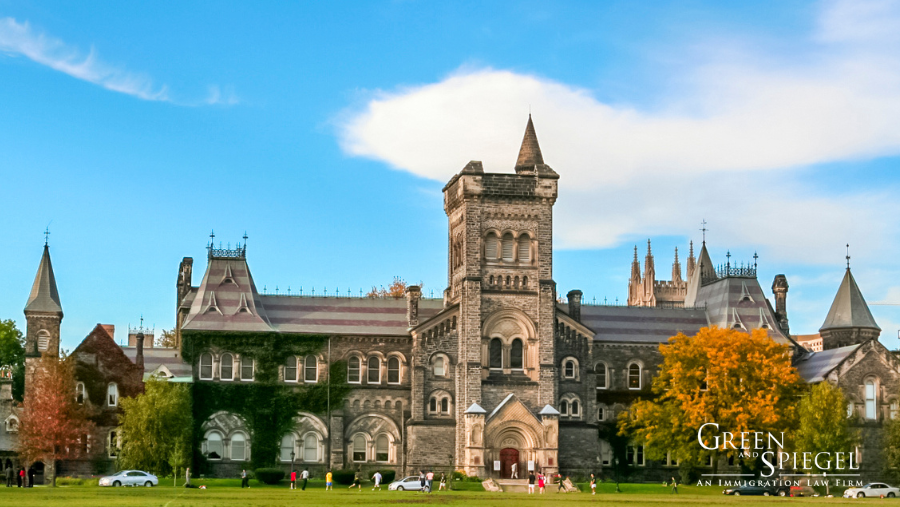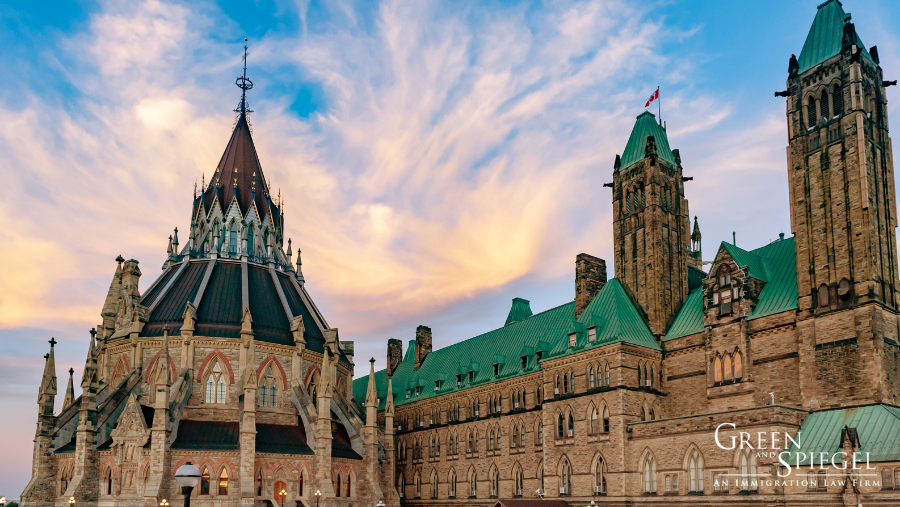
On January 22, 2024, Immigration, Refugees and Citizenship Canada (IRCC) announced changes to the international student program aimed at protecting its integrity and alleviating pressure on housing and healthcare. The announcement also called out some institutions for increasing their student intake numbers to drive revenues and concerns over students arriving in Canada with insufficient support.
This article provides an overview of the changes to the program, discusses the trends we are seeing for students who wish to obtain permanent residence (PR) in Canada, and provides a summary of relevant, but non-exhaustive, work authorization options available to students post-graduation.
1. Changes to the International Student Program
The changes reflect a balance of two initiatives: improving the integrity of the international student program and continuing to attract highly skilled and educated international students to Canada. The key changes to the program are the imposition of an intake cap which is regulated by the requirement for a Provincial Attestation Letter (PAL), increased financial requirements, and removal of work permit eligibility for the spouses of certain international students depending on their level of study. Students in master’s, doctoral, and professional degree programs are excluded from many of the new restrictions, reflecting an emphasis on promoting higher level and professional education.
Intake Cap and Provincial Attestation Letter (PAL)
For an initial period of two years, the Government has introduced a cap on the number of study permit approvals. For 2024, the cap is expected to result in approximately 360,000 approved study permits, apportioned across the designated learning institutions in the provinces and territories, and weighted by population. Study permit renewals from within Canada, and those pursuing master’s, doctoral, or elementary/secondary education programs are not included in the cap.
Students need to obtain a PAL from the province or territory where they plan to study, which serves as proof that the student has been accounted for under the cap. Students bound for Québec can fulfill the PAL requirement by obtaining a Québec Acceptance Certificate (CAQ). Excluded from the requirement are students applying for a master’s degree, doctoral degree, extension of their study permit from within Canada, minor children applying to study at the primary/secondary school level, and other limited exceptions.
Increased Financial Requirements
Given the overall cost of living in Canada, the Government increased the minimum proof-of-funds eligibility requirement from CAD $10,000 to CAD $20,635. The increase allows the Government to verify a substantial amount of funding available to support academic enrollment and ensure the student’s solvency. Students with accompanying dependent family, such as a spouse or children, will require additional funds.
Open Work Permits for Spouses of International Students
Prior to this change most spouses of international students were eligible to obtain an open work permit allowing them to accompany their partner in Canada. Now, open work permits are restricted to the spouses of international students in master’s, doctoral, and certain professional degree programs (e.g. B. Eng., Pharm D, DVM, BScN, to name a few).
Importantly, a spouse who is already in Canada and needs to extend their accompanying spousal open work permit is not subject to this restriction, even if their spouse is studying to obtain a non-professional undergraduate degree.
2. What options do international students have following graduation?
Immediately following the completion of studies, most graduates apply for a Post Graduation Work Permit (PGWP). A PGWP is an open work permit authorizing the graduate to work for a temporary period, for almost any employer, in any occupation across Canada. The duration depends upon the length of the study program, spanning from eight months to a maximum of three years. For example, undergraduate students are essentially guaranteed a three-year PGWP, as they typically complete four-year study programs.
Within the January 22, 2024, announcement, a positive change was made for master’s graduates. Those who complete a program of at least 8 months, are now eligible for a three-year PGWP. As master’s programs are typically shorter, prior to this change master’s graduates had less opportunity to gain Canadian work experience and contribute their knowledge to Canada’s labour market when compared to their undergraduate counterparts.
Of note, the PGWP allows students to start working on a full-time basis almost immediately after graduation. graduates who apply for a PGWP before the expiry of their study permit may work on a full time basis without a work permit, while they await a decision on their PGWP application, provided they meet certain other requirements.
On May 15, 2024, private colleges that have previously offered PGWP-eligible programs will no longer be eligible. Prospective students should check if the institution they are considering for their international education is impacted by the policy change and more generally, check the designated learning institution list which identifies if an institution offers PGWP-eligible programs.
3. Permanent Residency (PR) Pathway for International Students
The pathway to PR for international students has typically involved three steps:
- obtaining a PGWP;
- accumulating one year of skilled work experience in Canada; and
- submitting a PR application as a skilled worker through the Express Entry (EE) system.
EE uses a Comprehensive Ranking System (CRS) to assign scores to prospective Canadian immigrants. Candidates create a profile and are awarded up to 1200 points based on a variety of factors meant to assess their ability to succeed in Canada including age, level of education, official language proficiency, Canadian and foreign work experience, a sibling in Canada who is a Canadian or PR, etc. Eligible skilled workers who create their profile in the EE system are added into the pool of candidates and become eligible for selection. If selected, the candidate will receive an invitation to apply (ITA) for PR from IRCC.
Students usually create an EE profile after they have accumulated one year of full-time skilled work experience in Canada as this is the key minimum criteria to be eligible under the Canadian Experience Class (CEC) of the EE system. Graduates with Canadian work experience frequently score between 450-475 points on the CRS, and they historically have had an advantage on the CRS over other candidates due to their young age, level of education, English language abilities, and Canadian work experience. However, over the past several years we have witnessed a steady increase to the CRS scores being drawn from the pool. The draws have been well above 500 since September 2023, ranging between 525-561. In addition, there are now more variations in the draw categories than ever before. Some specifically target French speakers and candidates with healthcare or science/engineering/tech work experience, limiting opportunities for graduates from other programs and who speak only English. As a result of these trends, international students who are bi-lingual or who have graduated from these fields, are now at an advantage over others.
4. How can students stay in Canada beyond their PGWP, and become more competitive candidates in the Express Entry (EE) system?
Because it has become more difficult for graduates to obtain PR before the expiry of their PGWP, graduates are increasingly requesting their employer in Canada to support an employer-specific work permit. With employer support, a graduate can extend their work authorization in Canada beyond the expiry date of their PGWP, and can also become eligible to claim an additional 50 to 200 points on the CRS for holding a qualifying offer of arranged employment. Employers in Canada can support their employee either by obtaining an LMIA, or by supporting an offer of employment in an LMIA-exempt work permit category. We are also seeing more reliance on the provincial nominee programs (PNPs), which offer alternate pathways to PR supported by an employer’s job offer.
Labour Market Impact Assessment (LMIA)
The purpose of the LMIA process is to allow employers in Canada to hire temporary foreign workers (TFWs) and promote Canada’s economic and labour interests by filling genuine labour needs. Typically, this requires the employer to conduct recruitment to demonstrate that there is a labour need, meaning there is no Canadian or PR who is qualified to fill the role.
In 2018, the Government created the Global Talent Stream (GTS) which allows employers to obtain an LMIA through a streamlined process without a recruitment requirement for certain companies and occupations. The GTS can be used by innovative companies seeking to scale up and with a demonstrated need for unique and specialized talent or companies seeking to hire TFWs in in-demand and technology focused occupations, on the Global Talent occupations list.
Francophone Mobility/Mobilité Francophone Work Permit (LMIA-Exemption Code C16)
The Mobilité Francophone work permit promotes the presence of Francophones in Francophone minority communities outside the province of Québec. Any international student with intermediate French language ability and a job offer from a Canadian employer could obtain a work permit under this category.
International Experience Canada (IEC) Work Permit (LMIA-Exemption Code C21)
The International Experience Canada (IEC) work permit is for candidates who are between 18 to 35 years of age from a participating country that has a mobility arrangement in place with Canada. Work permit durations range from six months to two years, depending on the country of nationality. It is a lottery-based system which opens for a limited duration each year. Candidates can either apply for an open work permit under the Working Holiday stream or an employer-specific work permit under the Young Professionals (YP) stream. Using the YP stream can be a strategic choice because it allows the work permit holder to potentially claim CRS points in EE for holding a qualifying offer of arranged employment.
Importantly, IEC work permits are one of the few categories which cannot be used to extend one’s work authorization from within Canada. When an IEC work permit is approved, the applicant would be required to leave Canada, and upon re-entry to the country would be issued their work permit by a Canada Border Services Agency (CBSA) officer at the port of entry (airport or land border).
Post-Doctoral Fellow (LMIA-Exemption Code C44)
The Post-Doctoral Fellow work permit is for students who are completing or have completed their doctorate. Provided that the student or graduate will be receiving a stipend or salary to compensate for teaching, advanced study or research in a field related to their PhD, the eligibility criteria are generally met. The employer may be an educational institution, or it may be another type of entity such as a corporation, provided that the role is research focused.
Start Up Visa (SUV) Program – Alternate Pathway to PR
IRCC’s Immigration Levels Plan for 2024-2026 emphasizes entrepreneur-based immigration programs and places value on innovation, business growth, employment creation and scalability. The Start-Up Visa (SUV) program provides a direct path to PR for entrepreneurs and allows applicants to obtain a work permit while their PR application is processing so that they may work on the development of their business in Canada. International students of all backgrounds with an entrepreneur mindset and an innovative idea may consider this program if they wish to launch or join a start up business in Canada.
The SUV program requires that applicant to demonstrate a genuine goal to grow a business and contribute to the Canadian economy. The requirements recognize that each applicant’s background will be different. As such, there is no specific job experience requirement, age requirement or even investment requirement on the part of the applicant, unlike most of the other business and skill-based PR programs, making SUV one of the most attractive PR pathways for international students seeking to set up a novel business in Canada.
Innovation Stream – Under Development
In June 2023, IRCC announced the intention to develop an Innovation Stream which would implement LMIA-exempt employer-specific work permits for up to a duration of five years for highly skilled workers who are:
- In select in-demand occupations.
- Destined to work for employers who have been identified by the Government of Canada as contributing to industrial innovation goals.
On March 22, 2024, the innovation stream employer-specific work permit was launched, and is applicable to candidates who have a job offer from one of the employers participating in the Global Hypergrowth Project. We are eagerly anticipating further announcements under this new stream.
As the Canadian immigration landscape continues to evolve, it is important to stay abreast of the latest developments and to pivot strategically as needed to obtain your desired immigration outcome. This is where working with a representative like Green and Spiegel LLP can really make a difference. Founded in 1962, Green and Spiegel is Canada’s largest and oldest immigration law firm with over 60 years of experience assisting a diverse global clientele to navigate confidently the Canadian immigration system. As a boutique firm, Green and Spiegel focuses exclusively on immigration law and provides a broad range of immigration services, developing creative solutions to all types of immigration challenges.
If you are an international student studying in Canada, and wish to obtain permanent residence, please contact us for more information.






